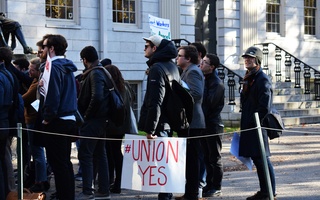To the Editor:
It is always sad when a great university misses a significant teaching moment. The prolonged strike of food service workers at Harvard is an example of just such a missed opportunity.
Press reports indicate that negotiators are bogged down over two issues: a guaranteed annual income for full-time staffers and health insurance. The first derives from the seasonal nature of the academic year and the inability of many Harvard food service workers to collect unemployment benefits during seasonal layoffs. The second is a universal problem that has an outsized impact on low wage workers like the strikers.
When I studied at Harvard, labor relations greats were on the faculty. I studied with Derek Bok and Archibald Cox and Business School Professors James Healy and Thomas Kennedy. Over the decades since then Harvard has led the way in establishing reasonable—and in some cases generous—labor standards for its employees and its contractors.
Approximately 25 years ago, Harvard set an area wide precedent in the construction industry by entering into a wide ranging project labor agreement for university capital improvements. Brokered by the late John Dunlop, it set meaningful minimum area standards guarantees in exchange for a no-strike commitment on covered jobs. Billions of dollars of construction work has been completed under that agreement and its successors.
More recently Harvard extended its creative problem solving to service employees and service contractors. In an effort to avert a protracted custodians strike the University adopted a “parity policy” extending many of its own meaningful employment standards to its service providers. Not only did that step resolve a labor management dispute, it improved the wages and working conditions of hundreds of area workers and their families.
That creativity and ingenuity have yet to show their face in the negotiations to end this dispute. The University seems dug in and the workers feel disrespected. Local 26, on behalf of hundreds of longtime, loyal employees has brought legitimate issues to the employer’s attention. The response has been disappointing and demoralizing.
As income inequality continues to grow surely the world’s wealthiest university can take the steps necessary to address the legitimate needs of some of its lowest paid workers. Harvard has proven that it has the capability to creatively respond to the needs of its workers. It is time to prove that it still has the will to do so.
Donald J. Siegel, a 1971 Harvard Law School graduate, is an attorney in Boston.
Read more in Opinion
The Necessity of NostalgiaRecommended Articles
-
Fair Harvard, Again?I still wonder and worry about the students who didn't walk out and never will, the students who don't and won’t agree with those of us who support the strike, and—perhaps most of all—the students who walked out because they felt coerced in some way into doing so.
-
Unionizing Students Should Consider Manufacturing’s LegacyHowever it changes the nature of graduate education, a unionized workforce will certainly change its economics.
-
 At 'Drop the Appeal' Rally, HGSU-UAW Presents Petition to Mass. Hall
At 'Drop the Appeal' Rally, HGSU-UAW Presents Petition to Mass. Hall -
 Harvard Settles Lawsuit, Will Change Labor Policy
Harvard Settles Lawsuit, Will Change Labor Policy -
 Treating Contracted Employees Right
Treating Contracted Employees Right













